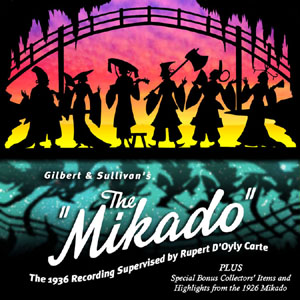The 1936 D'Oyly Carte Mikado
Conductor: Isidore Godfrey
Recorded in London, |
|
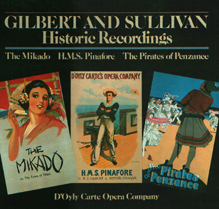 Arabesque 71-6453 |
On 30 June 1934, Sir Henry Lytton gave his farewell D'Oyly Carte performance in the role of Jack Point, ending a fifty-year association with the Company. When the Company resumed touring after a summer vacation, the new principal comedian was a man named Martyn Green. Green was no stranger to D'Oyly Carte audiences; he had been playing Major-General Stanley and Robin Oakapple regularly for the last several seasons, and he had been giving Lytton the occasional night off for nearly a decade. But now, Lytton was gone, and Green was finally the Company's marquis performer.
Up to this point, Green's contribution to the Company's discography was limited to the Major in the 1930 Patience (this being a traditional training role for the patter understudy). However, after the 1933 recording of The Sorcerer, the Company had on disc every opera in its repertory except for Cox & Box, an opera the Company evidently had no serious plans to record. Therefore, after several busy years (fourteen sets from 1926 to 1933), D'Oyly Carte made itself scarce in the recording studio.
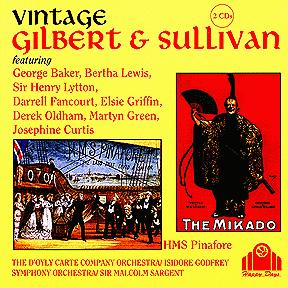 Happy Days CDHD 253/254 |
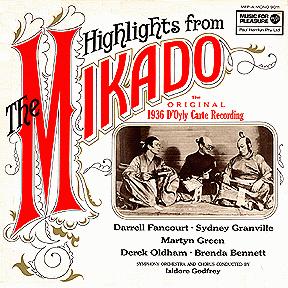 EMI Music for Pleasure MFP-A 9011 |
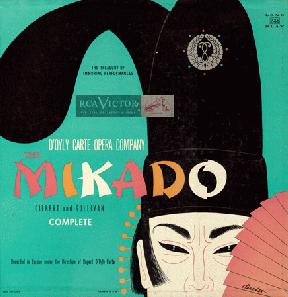 Victor WCT/LCT 6009 |
When a new recording finally did come out, it was a remake of The Mikado, notwithstanding the fact that a strong recording of the opera was already in the catalog and was less than ten years old (the 1926 Mikado). Here, for one of the few times in D'Oyly Carte history, a recording was made not to exploit a new technology, but merely to put its new star singing its most-popular opera in as many living rooms as possible.
There is every reason to suppose that this Mikado was intended to be the first of a series, just as the last one had been. However, with war on the horizon, this would be the last 78rpm recording made. By the time the Company started recording again, thirteen years had gone by and a new technology, the long-playing record, had started to replace 78's.
This was the first complete set to be conducted by Isidore Godfrey, and he leads the (uncredited) orchestra through a vibrant account of the score. All of the men in the cast—Fancourt, Oldham, Granville, Green and Rands—are rightly accounted legends. Unfortunately, the women let the set down. Brenda Bennett fairly shrieks her way through Yum-Yum, while Josephine Curtis's voice is nearly out of control and is considerably worse than many amateurs I've heard.
Though originally issued on 78's, this recording was also issued on LP in 1955. It has been frequently re-issued on CD, including transfers by Pro Arte, Arabesque, Happy Days, J. C. Lockwood's 78s 2 CD, and Chris Webster's Sounds on CD. In the Pro Arte transfer, I understand that the two verses containing the n----- word are omitted. In the Happy Days transfer, both verses are retained. The RCA re-issue from 1955, includes the offending verses, but prints the word as "negro" in the included libretto.
Particularly noteworthy, the Webster transfer includes bonus collectors' items and also master-based transfers of highlights from the 1926 Mikado, as follows:
- Leslie Rands on recording Pish-Tush. An extract from a private "talking letter" to Martyn Green, c.1954/5.
- Sylvia Cecil sings "Minerva" from Princess Ida. An extract from "G&S: The Story of a Great Partnership", BBC Radio, 1947; BBC Concert Orchestra conducted by Stanford Robinson.
- Martyn Green in October, 1974. Martyn Green's curtain speech (edited) given during his amateur San Diego 'church chancel' production of HMS Pinafore.
-
Isidore Godfrey's only commercial non-D'Oyly Carte recordings.
- Vocal Gems from The Mikado (in two parts)
- Vocal Gems from The Gondoliers (in two parts)
- Highlights from the 1926 Mikado. Eleven tracks, namely, those featuring Henry Lytton's Ko-Ko.
James McCarthy supplied this review of the Conifer (Happy Days) CD re-issue that was coupled with the 1930 Pinafore. (Courtesy of International Record Review.)
The value of these recordings lies in the study of performance practice, a window, if you like, into the way these operettas were played in the first part of [the last] century. They are essentially performances by the D'Oyly Carte Opera Company, although not directly advertised as such. Pinafore was recorded in 1930 and The Mikado, in 1936. Much is made by G&S traditionalists of the way these pieces were performed in "the good old days," and the record notes make no bones about this "golden age" of G&S performances. If these performances are any guide, we haven't missed much. ... The Mikado is a later, and better recording and again, whatever special talents many of these good folk may have had in the theatre, they are not carried through to the recording. Leslie Rands is an indifferent Pish-Tush, Sydney Granville a lightweight and humourless Pooh-Bah, and Derek Oldham a sad-sack without any of the boyish ring which can make Nanki-Poo one of Gilbert's most attractive heroes. The women aren't much better, Brenda Bennett's white voiced Yum-Yum is unsteady, and the Katisha of Josephine Curtis so bad as to beggar description. On the plus side, Martyn Green is excellent, one of the most consistent luminaries in the variable D'Oyly Carte canon down the years. To this I happily add Darrell Fancourt, his Mikado is first rate. Marjorie Eyre turns in a good, strong Pitti-Sing as well. Isidore Godfrey's direction of the orchestra is stylish and provides one of the few musical pleasures to be had on these recordings. The transfers from early electrical 78's are remarkably good, with some distortion showing in the climaxes. The original recordings were supervised by Rupert D'Oyly Carte, and if that is a guarantee of the benchmark set by Gilbert and Sullivan, it is high time the whole G&S "tradition" was re-examined.
[THE GRAMOPHONE, November 1936, (Vol. XIV); pg. 246]
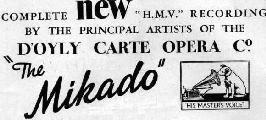 The Gilbert & Sullivan News — March, 1937 |
"The Mikado is such early electrical recording and falls so far short of to-day's standard as almost to justify a re-recording, for of all the Savoy operas this is the one that first and foremost should give no cause for cavil." In these terms Elsie McLachlan wrote in this journal (January, 1934) of the H.M.V. recording of The Mikado issued in 1927 (D1172-1182). Well, now it has been re-recorded; and I am afraid the hosts of Gilbert and Sullivan fans are not going to be too well pleased with the new version.
The old cast was as follows: […see here]. It was an excellent cast and only one member of it, so far as I know, was not a D'Oyly Carte artist. This was George Baker, who made a very satisfactory Pish-Tush. What has happened to dear old Leo Sheffield I do not know; but a motor accident has robbed us forever of Bertha Lewis and Sir Henry Lytton has also gone to his last rest. Their parts have been re-allotted, it is true, but their places have not been filled.
For the new recording, Darrell Fancourt and Derek Oldham were still available. The other parts have been allotted as follows: [....see above].
Very old stagers can recall the original Ko-Ko, namely George Grossmith, senr. I cannot, of course, but I can remember two very fine exponents of Pooh-Bah, Rutland Barrington and Fred Billingham. Leo Sheffield was never quite in their class and Sydney Granville, to my mind, is miscast for the part. He is an old hand; I can remember him years ago tripping around as young Strephon. He still sings well and is a painstaking, conscientious artist, but comedy is not really his role and the brand of humour needed for a wholly successful Pooh-Bah is beyond him. However, he easily scores over Sheffield so far as singing is concerned, points his remarks with considerable skill and generally speaking gives quite an enjoyable performance.
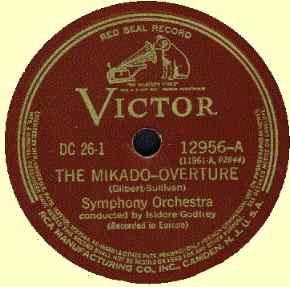 Victor 12956 |
Whenever Yum-Yum is mentioned I think of Clara Dow and find it hard to remember those who succeeded her; but I welcome Miss Brenda Bennett as a very agreeable portrayer of the little Japanese miss who thought burial alive was such a stuffy death. I welcome Miss Marjorie Eyre just as warmly. She cannot make me forget Jessie Bond or Beatrice Boarer; her actual singing could do with a little more smoothness and polish, but she has a charming voice and an excellent sense of comedy. Her Pitti-Sing is a captivating little minx. I wish I could take as kindly to Miss Josephine Curtis, but I cannot. She still has a lot to learn. Her voice is a rich, fruity contralto and it is not always under control, for at times her phrases fizzle out at the end. Moreover, she robs her Katisha of dignity and dramatic power by her curious way of handling her words.
Mr. Leslie Rands is another offender when it comes to handling words and thus, although he has a good voice, I can only regard his Pish-Tush as adequate. Somehow or other, I feel that the comedian's mantle has been thrust upon poor Mr. Martyn Green. He strikes me as a poor comedian but quite a good singer; and I can imagine him making an agreeable Jack Point. It is rather a novelty to hear Ko-Ko's part really sung; it takes me back to the days of C. H. Workman, only it reminds me that Workman was an excellent comedian as well as a good singer. The novelty in the present instance is not too refreshing, for Ko-Ko's part in The criminal cried falls very flat while I've got a little list is little short of a fiasco.
Once more Mr. Darrell Fancourt gives his remarkable performance as the Mikado; I have just a little preference for his earlier performance, but anyway there is very little difference. How I should love an opportunity of comparing his version of A more humane Mikado with one by that great artist Leicester Tunks! Mr. Derek Oldham is his old self as Nanki-Poo, the best all-round exponent of the part that I have ever heard. He seems to have lost some of his skill in kissing Yum-Yum, but he still succeeds in giving me the impression that at least one heir to the throne of Japan was educated at Eton and Oxford. It is now high time for me to pay a well-deserved tribute to the chorus for its excellent work throughout the opera.
One expects good diction from the old hands and one gets it. It is very evident that the new comers have also been trained to enunciate their words clearly. Clarity of diction is most marked throughout the entire work. I should hesitate to stress this commendable feature of the new recordings on the evidence of my own ears, because I know the words well enough to prompt the singers; but a friend who has heard some of the records, and who has only a nodding acquaintance with the opera, assured me unasked, that he had heard many of the words which were formerly unknown to him. It is unfortunate, however, that some of the singers do not always realise the relative importance of syllables. To sing line after line with practically equal stress on all the syllables is to produce a grotesque effect for which there is no justification. Miss Curtis does this too often. She even makes Katisha's entry exclaiming "Your rev-els cease; assist me, all of you!" In a similar kind of way Mr. Rands does his best to make Our great Mikado, virtuous man, sound like doggerel set to a jingle.
In one respect the present set of records is vastly superior to the former set: the recording is enormously better. I imagine, too that the new orchestra is larger than the old one. So far as a performance is concerned, the new recording is better sung, on the whole; but it is not so humorous nor so reminiscent of the old Savoy atmosphere.
It is too good to damn, and not good enough to get excited over; it is, in fact, a real curate's egg.
H. F. V. L.
| Date | Label | Format | Number | Comments |
|---|---|---|---|---|
| 1936 | HMV | 78rpm | DB4038/48 in Album 260 | Manual side couplings |
| Jan. 1937 | RCA Victor | 78rpm | 11961/71 in Album C-26 | Manual side couplings |
| 11972/82 in Album AC-26 | Slide auto side couplings | |||
| 1940? | HMV | 78rpm | DB8105/15 | Drop auto side couplings |
| 1940 | RCA Victor | 78rpm | 12956/66 in Album DC-26 | Drop auto side couplings |
| Dec. 1952 | RCA Victor | LP | LCT-6009 | Not issued in England until 1955, and then probably not on 45's |
| 45rpm | WCT-6009 | |||
| 1955 | HMV | LP | ALP 1255/6 | |
| ca. 1969 | EMI Music for Pleasure | LP | MFP 2038 MFP-A 9011 |
Highlights |
| 1980 | Arabesque | LP | 8051-2L | |
| 1980? | Arabesque | Cassette (not verified) |
9061-2L | |
| 1982 | Arabesque | LP | 71-6453 | Four discs issued by the Book-of-the-Month Club, with the 1929 Pirates (2 1/2 sides), the 1930 Pinafore (2 1/2 sides) and the 1936 Mikado (3 sides). |
| c. 1986 | Arabesque | CD | Z8051-2 | |
| 1992 | Pro Arte | CD | CDD 3416 | |
| 1994 | Happy Days | CD | CDHD 253/254 | Also includes 1930 Pinafore |
| Cassette | MCHD 253/254 | |||
| 2001 | 78s 2 CD | CD | GS16 | Also includes 1926 HMV Mikado. (See review on that page.) |
| 2003 | Sounds on CD | CD | VGS 245 |
| Side Nbr | Matrix Number |
Selection | Rec. Date |
|---|---|---|---|
| 1 | 2EA2995-2A | Overture, part 1 | 22 Jun 36 |
| 2 | 2EA2996-3A | Overture, part 2 | 22 Jun 36 |
| 3 | 2EA2948-1 | If you want to know who we are | 3 Jun 36 |
| 4 | 2EA2949-1 | A wandering minstrel I | 3 Jun 36 |
| 5 | 2EA2946-1 | Our great Mikado, virtuous man | 3 Jun 36 |
| 6 | 2EA2961-1 | Young man, despair | 4 Jun 36 |
| 7 | 2EA2947-1 | Behold the Lord High Executioner | 3 Jun 36 |
| 8 | 2EA2963-1 | Comes a train of little ladies | 5 Jun 36 |
| 9 | 2EA2962-1A | So please you, Sir | 5 Jun 36 |
| 10 | 2EA2959-1A | I am so proud | 4 Jun 36 |
| 11 | 2EA2956-2A | With aspect stern and gloomy stride | 4 Jun 36 |
| 12 | 2EA2953-2 | Your revels cease! | 4 Jun 36 |
| 13 | 2EA2954-4 | The hour of gladness | 4 Jun 36 |
| 14 | 2EA2965-1 | Braid the raven hair | 5 Jun 36 |
| 15 | 2EA2964-2 | The sun whose rays | 5 Jun 36 |
| 16 | 2EA2952-3 | Brightly dawns our wedding day | 22 Jun 36 |
| 17 | 2EA2955-2 | Here's a how-de-do! | 4 Jun 36 |
| 18 | 2EA2960-1A | A more humane Mikado | 4 Jun 36 |
| 19 | 2EA2958-1 | The criminal cried | 4 Jun 36 |
| 20 | 2EA2950-3A | See how the Fates their gifts allot | 22 Jun 36 |
| 21 | 2EA2951-4A | Alone, and yet alive! | 22 Jun 36 |
| 22 | 2EA2957-2 | There is beauty in the bellow of the blast | 4 Jun 36 |
| Side Nbr | Matrix Number |
Selection | Rec. Date |
|---|---|---|---|
| 5 | 2EA2946-1 | Our great Mikado, virtuous man | 3 Jun 36 |
| 7 | 2EA2947-1 | Behold the Lord High Executioner | 3 Jun 36 |
| 3 | 2EA2948-1 | If you want to know who we are | 3 Jun 36 |
| 4 | 2EA2949-1 | A wandering minstrel I | 3 Jun 36 |
| 2EA2950-1 … |
See how the Fates their gifts allot | 3 Jun 36 or 4 Jun 36 | |
| 2EA2951-1 … |
Alone, and yet alive! | 3 Jun 36 or 4 Jun 36 | |
| 2EA2952-1 … |
Brightly dawns our wedding day | 3 Jun 36 or 4 Jun 36 | |
| 12 | 2EA2953-2 | Your revels cease! | 4 Jun 36 |
| 13 | 2EA2954-4 | The hour of gladness | 4 Jun 36 |
| 17 | 2EA2955-2 | Here's a how-de-do! | 4 Jun 36 |
| 11 | 2EA2956-2A | With aspect stern and gloomy stride | 4 Jun 36 |
| 22 | 2EA2957-2 | There is beauty in the bellow of the blast | 4 Jun 36 |
| 19 | 2EA2958-1 | The criminal cried | 4 Jun 36 |
| 10 | 2EA2959-1A | I am so proud | 4 Jun 36 |
| 18 | 2EA2960-1A | A more humane Mikado | 4 Jun 36 |
| 6 | 2EA2961-1 | Young man, despair | 4 Jun 36 |
| 9 | 2EA2962-1A | So please you, Sir | 5 Jun 36 |
| 15 | 2EA2964-2 | The sun whose rays | 5 Jun 36 |
| 14 | 2EA2965-1 | Braid the raven hair | 5 Jun 36 |
| 8 | 2EA2963-1 | Comes a train of little ladies | 5 Jun 36 |
| 20 | … 2EA2950-3A |
See how the Fates their gifts allot | 22 Jun 36 |
| 21 | … 2EA2951-4A |
Alone, and yet alive! | 22 Jun 36 |
| 16 | … 2EA2952-3 |
Brightly dawns our wedding day | 22 Jun 36 |
| 1 | 2EA2995-2A | Overture, part 1 | 22 Jun 36 |
| 2 | 2EA2996-3A | Overture, part 2 | 22 Jun 36 |
Notes:
- The table above shows the published takes in the order recorded. Where a session produced both unpublished and published takes for the same selection, the unpublished matrix numbers are shown in italics. Where none of a selection's takes from a given session were published, the entire row is shown in italics, and the side number is blank. Where it is not possible to make a likely guess about the number of takes recorded at a session, this is indicated with … Where the published take was achieved without a make-up session being required, the unpublished takes for the same selection are not shown.
- The bulk of the recording—all of it except for the overture—was initially recorded over just three days in early June, 1936. It appears that all of the material for male chorus only was recorded on 3 June, women's chorus on 5 June, leaving 4 June as a very busy day to record the rest of the opera.
-
Francis says that side 13, matrix 2EA2954-4,
is a transfer otherwise unpublished of 2EA2954-2. The list of recording
sessions above is consistent with Francis's observation, for otherwise it would appear that four
takes of the side were recorded on the same day. This would have been most unusual, two or three
takes usually being the most that would be attempted in one session.
Jim Lockwood observes: "I don't know about the original matrix number, but the side is unmistakably second-generation. On can actually hear the background noise from the source being faded in. The result is, of course, an anomalously noisy side. I can't imagine why they would have done this unless the original take had some defect that they were able to cut out by dubbing it."
